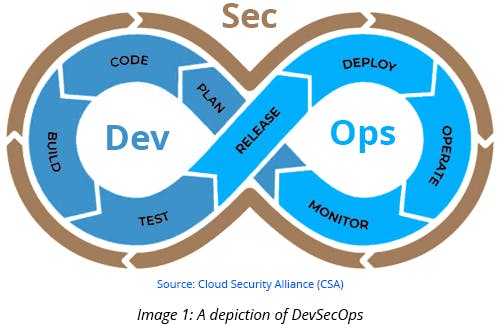Companies today spend a lot of time, effort, and resources on cybersecurity. But, let's face it, despite their full-fledged efforts, attackers eventually figure out how to get in and steal data. According to a report by IBM, the average total cost of a data breach is approximately $4 million.
Sometimes, due to tight deadlines, a software build misses out from going through all the necessary security checks adequately. This has brought about a quintessential segment, called Security, in the ever-growing DevOps practice that promotes continuous integration and continuous delivery (CI/CD). Chances of security breaches can diminish if security considerations are made an integral part of the DevOps process from the initial phase.
What is DevSecOps?
Swift and secure delivery of software solutions is the new requirement of many fast-moving industries, especially in e-commerce. Development + Security + Operations is the idea that is being considered for incorporating security practices into the DevOps process from the beginning. Security brings a unique appeal to the DevOps strategy when it is implanted in every team’s DNA that is involved in the process – be it developers, quality control, security, operations, project management team, etc.

All teams are responsible for maintaining security, and hence, should collaborate and work together from the initial stages of the process. This will help the developers in coding the products more securely and help in ensuring DevOps security.
Limitation of the Traditional Way of DevOps
DevOps originated with the need for quick delivery of software products. As the business demanded speedy deliveries of products, the development was given the highest priority, leaving security checks on the sideline. As a result, even organizations with the most sophisticated development processes experienced security breaches. The quick delivery also paved the way for security risks, as speed usually increases the possibilities of risk.
If the releases are planned and they have long intervals in between, the security procedures can be performed towards the end. However, to meet the rapidly changing demands of the business, many organizations do multiple releases every week or even every day. In such a case, performing a security check towards the end of the development process would lead to delays.
These security checks may also be time-consuming, which defeats the purpose of DevOps. Additionally, if bugs or issues are found towards the end of the process, the developers would need to find a remedy ASAP to firefight these issues, which may not be a comprehensive solution. This may force the organizations to release the products despite vulnerabilities.
Benefits of Following DevSecOps Practices
- Hackers always find their way to get into an application to exploit the software, which usually incurs losses for the organization. DevSecOps helps in saving cost and time by eliminating security incidents. It ensures security in each phase and has secured a crucial role in the Software Development Life Cycle (SDLC).
- The growing requirements of businesses have made it almost inevitable to integrate security protocols from the very beginning in the DevOps process. If an organization wants a product to be delivered quickly with all the security measures, it has to look into the option of adapting the DevSecOps approach.
- Implementing DevSecOps has shown commendable results in achieving better efficiency and a higher return on investment (ROI).
- Another advantage of DevSecOps is that it helps in regulatory compliance of the product, which means the product can be sold hassle-free.
Here are a few recommendations an organization should consider when it opts for the DevSecOps approach to get the most out of it.
Best Practices in DevSecOps Approach
1. DevOps Security Automation
Speed is the foremost requirement of CI/CD. While quick delivery gives an advantage to the development team to work on other changes, it increases the chances of security vulnerabilities that are dependent on manual checks. In such scenarios, automation can be of huge help while dealing with such security vulnerabilities.
2. Risk Assessment
Assessment of risks in advance will help the teams in getting ready with the fixes for possible risks that might show up in the next phases of development of the product. It helps in achieving the overall stability of the product to be delivered by identifying and eliminating any security threats in advance. Most organizations have this process in place, but it is always better to make sure that this activity is performed without amiss.
3. Get Ready with Security Protocols
Implementing security protocols helps the development teams in coding and designing the products more securely. Most developers are unaware of their code’s vulnerability towards an attack. Security attacks can be reduced drastically when they use the code for the products that comply with security protocols. This can prove to be a good investment for an organization as it would help in preventing any vulnerability by the development team.
4. Develop Small Pieces of Code
Applying security protocols in large chunks of code can be complicated for developers as reviewing the entire code can be very time-consuming. Developing small pieces of code can help the development team in completing the code quickly while easily integrating security protocols. In such a scenario, the vulnerabilities, if any, can be found and acted upon sooner.
5. Analyze Critical Tools/Software for Vulnerabilities
When considering an available open-source software tool, the developers must analyze it for vulnerabilities. They may have to invest extra time to fix such vulnerabilities, but the process can save a lot of time in the overall SDLC.
Challenges in Implementing DevSecOps
- The biggest challenge is to get the Development and Security teams to work together. The teams should coordinate in each phase of the development process to get the best out of the DevSecOps approach.
- Choosing the right tools is a huge challenge. Since each team uses different tools, it is important to integrate the tools to build, deploy, and test in a stable manner.
- It’s not wise to run after perfection in the initial stages of implementing DevSecOps as it may take some time to merge the processes to make them work in a synchronized manner. You can see a remarkable difference once all the processes of DevSecOps are in sync.
To conclude, DevSecOps is an excellent approach that adds security to the tried-and-tested DevOps process from the initial stages, which helps in preventing any possible security breaches, and saves a lot of time and cost for an organization.



